13. 04. 2021
How to make your city more resilient with RESCCUE?
Photo by Benjamin Voros on Unsplash
RESCCUE is an H2020 research project that aimed to tackle climate-related challenges in cities, with special focus on the water sector, taking into consideration physical, social and economic factors. Since 2016, RESCCUE has developed methodologies and tools to support cities increase their resilience. The three RESCCUE cities, Barcelona, Bristol, and Lisbon, have become a testing platform for the cutting-edge technologies developed in RESCCUE, but these are also ready to be deployed to different types of cities, with different climate change pressures.
From climate change scenarios to Resilience Action Plans (RAPs), the outputs that the project has been produced are very diverse, always with a special focus on the urban water cycle and urban floods. All the project outputs have a common goal: to increase the resilience of cities from around the world, by offering methodologies and tools that anyone can use and replicate. What RESCCUE has produced is only the beginning. The work initiated in RESCCUE will continue to move forwards to support cities become more and more prepared for the coming challenges.
In order to ease the application of these outputs in other cities, RESCCUE has prepared a set of materials, which are described in this article. With them, you will learn how to make your city more resilient by using RESCCUE’s tools and methodologies.
Learn more about RESCCUE
Before going deeper into RESCCUE’s results, we encourage you to learn more about the project. The RESCCUE video will offer you a general overview of the project’s approach, objectives and results.
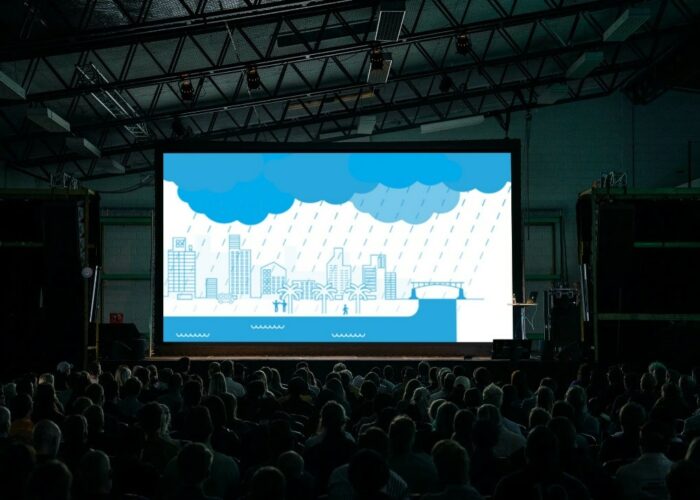
How to apply RESCCUE in other cities?
RESCCUE has developed a set of materials to ease the replication in other cities of the innovative solutions already applied in Barcelona, Lisbon and Bristol. Here you will find a complete list of platforms and publications that will guide you through the application of the RESCCUE results in other cities.
RESCCUE E-book
The RESCCUE e-book gathers the main lessons learned from the project and best-practice advice to apply the RESCCUE results in other cities. This document has an interactive menu, located on the left side, which allows you to navigate between the different contents. Also, throughout the chapters of the e-book, there are different buttons linked to external documents and materials for further information.
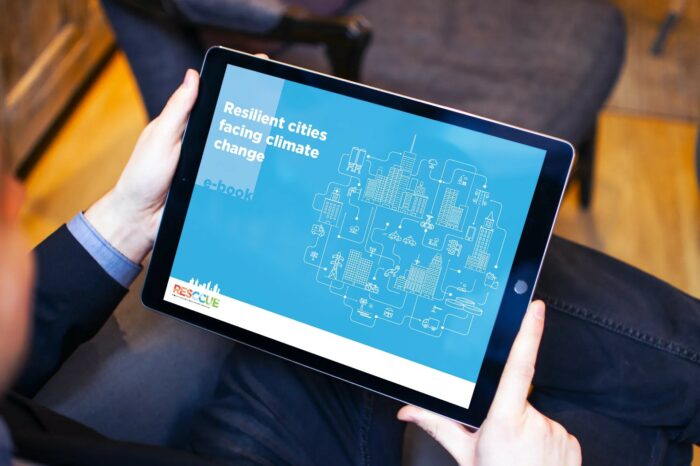
The first part of the e-book focuses on presenting the RESCCUE project, as well as offering information about the e-book itself and its objectives and a short description of the suggested path to develop the different steps of the RESCCUE project. Then, the successful experiences of the RESCCUE cities are detailed. For each city, general data and information are showcased, as well as the main climate-related risks they face.
From the creation of the climate change scenarios projections to the development of the Resilience Action Plans and the RESCCUE communication materials, the following chapters focus on visually explaining, with the help of images and infographics, how the project has been developed step by step and what are the main lessons learned from each stage. Likewise, at the end of each chapter, the best-practice advice is summarized in order to facilitate the replication of these results successfully in other cities.
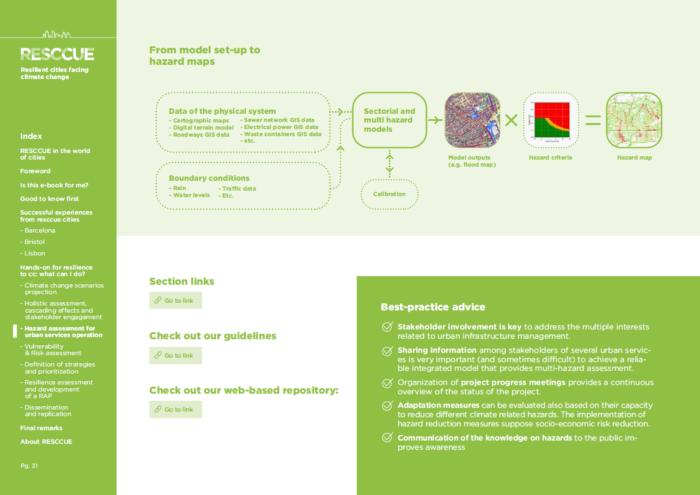
Also, at the end of each chapter are some links of interest. From project deliverables to some of the tools used, these complementary materials will help expand the information and facilitate the replication of RESCCUE results in your city.
Finally, at the end of the e-book you can find the technical factsheet of the RESCCUE project as well as information about the authors of this document.
RESCCUE Toolkit
The RESCCUE Toolkit is an interactive platform where the main project results are gathered, along with the guidelines outlining the steps to be taken to make your city resilient.
At the top of the RESCCUE Toolkit homepage you can access the video and the e-book to find out more about the project. Likewise, if you want more information, in the “Project Overview” tab of the top menu you will find more details about RESCCUE, the project consortium and a repository of articles published by the experts behind RESCCUE.
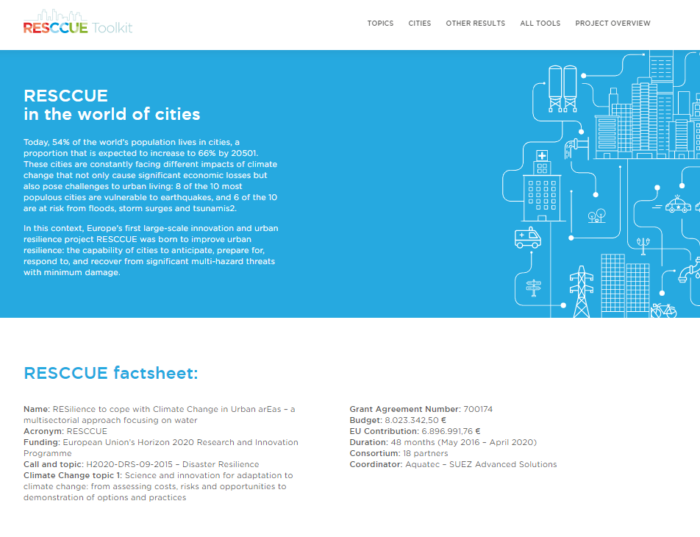
On the homepage you can also choose to navigate through the different topics of the project or through the 3 RESCCUE cities. Therefore, you can choose whether you prefer to see the guidelines, tools and methodologies used or the databases and results obtained either in each stage of RESCCUE or in each of the cities.
The six topics of RESCCUE are the following:
- Climate change & Extreme events scenarios
- Strategic urban services modelling
- Impact assessment & cascading effects
- Holistic resilience assessment & management
- Resilience & adaptation strategies
- Water-focused city resilience roadmap
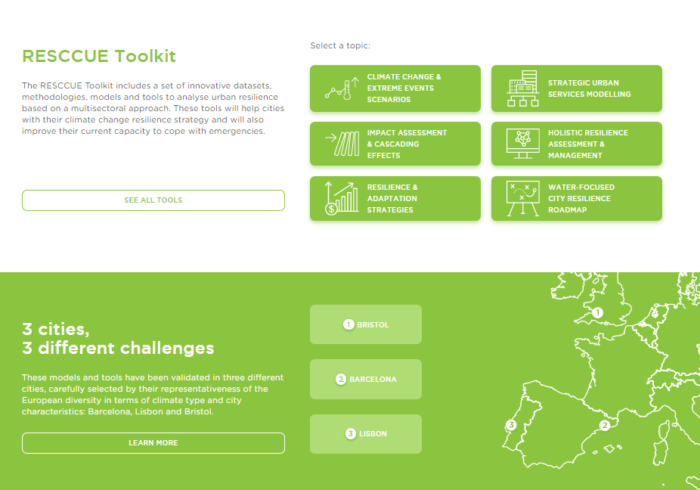
If you access one of the topics, you will discover the guidelines and the results related to this stage of the project. First, the guidelines will provide you with information on how the research has been carried out and how it can be replicated in other cities. Right after the guidelines, you will find the contact information of the experts involved in this stage of RESCCUE.
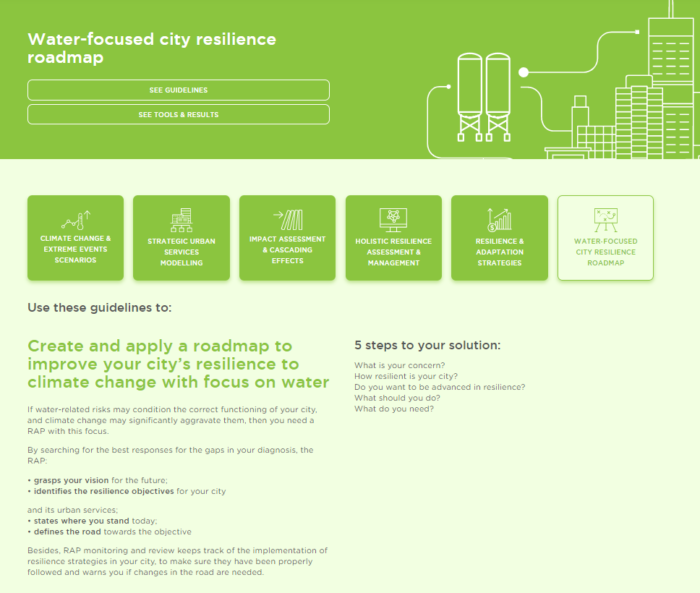
Finally, at the bottom of the page of each topic, you can navigate through the different tools and results corresponding to this stage. Each result is classified according to whether it is a publication, methodology, tool or database. You can display the different tabs for more information and click on the button to access the results.
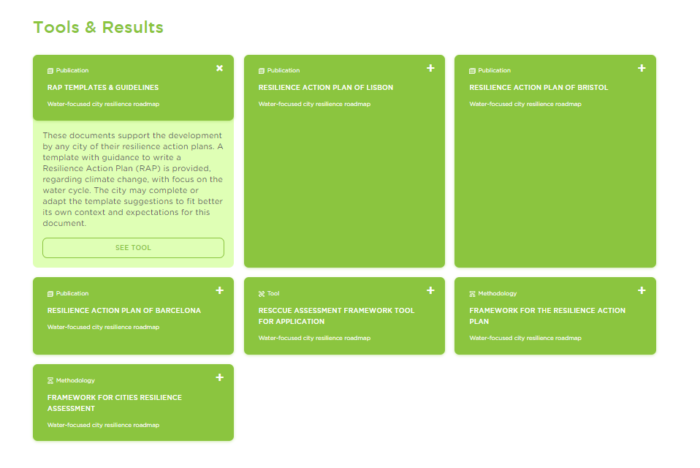
If you want to see all the results of the project, you can find them in the “All Tools” section of the top menu. In this section you can filter the results by topic or by city and navigate through them. In the same way as in the pages of each topic, you will be able to display each tab and discover more information about the result and click on the button to access the result you want to see.
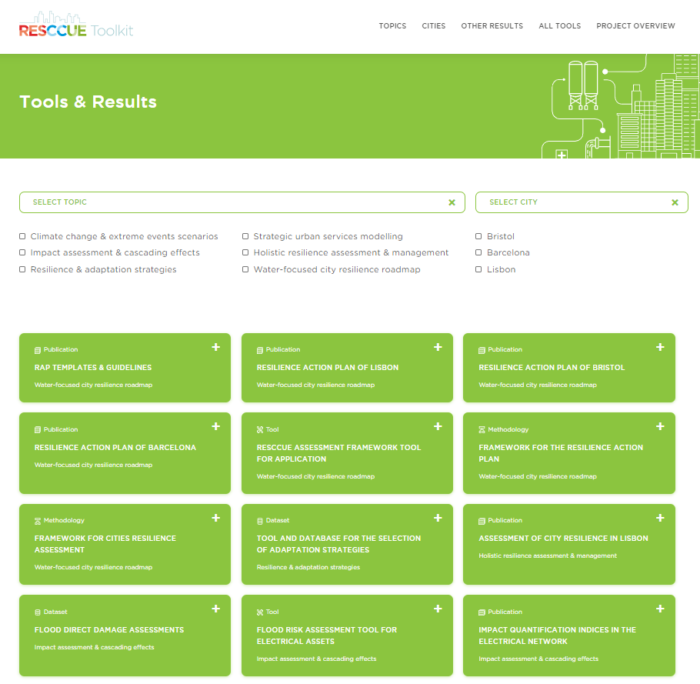
Finally, the RESCCUE Toolkit also includes other outstanding materials and results of the project. In the “Other results” section of the top menu, also accessible from the bottom of the homepage, you will find the following materials
Scientific Publications
Scientific dissemination is vital to provide a stronger understanding of current research to the scientific community. RESCCUE has published several project-related papers in different peer-reviewed journal, as well as two special issues on the project published in the Sustainability Journal, entitled “Integrated assessment of climate change impacts and urban resilience: from climate and hydrological hazards to risk analysis and measures” and “Urban Resilience in a context of climate change.
RESCCUE Deliverables
Deliverables are additional outputs, such as reports, that must be produced at a given moment during the project’s lifetime. Within RESCCUE, several deliverables have been produced, which gather all the technical information.
RESCCUE Maps
he maps developed within the RESCCUE project have been gathered in the Clarity project portal, a repository that compiles different case studies. Thanks to its powerful visualization platform, you can navigate through some of the RESCCUE project’s main results in the form of maps.
Dissemination Materials
The communication and dissemination of the project is such an important task that completes the research period and goes beyond it. Multiple activities and materials were organized and created in order to facilitate information about the project, its objectives and outcomes, and to promote the widest application of the tools developed in other contexts and places.
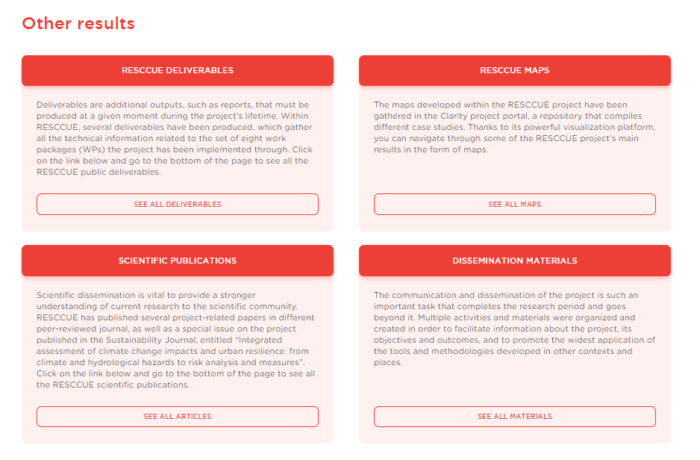
By clicking on the tab button, you will access a list of extra project materials that will offer you more detailed information about the results achieved during the 4 years of RESCCUE.
Contact us!
Have a question about RESCCUE? Are you interested in collaborating with any of our partners? Contact us at info@resccue.eu and get support from the experts behind the project.
In case you have questions about a specific topic, you can find expert contact info at the final section of each of their pages:
